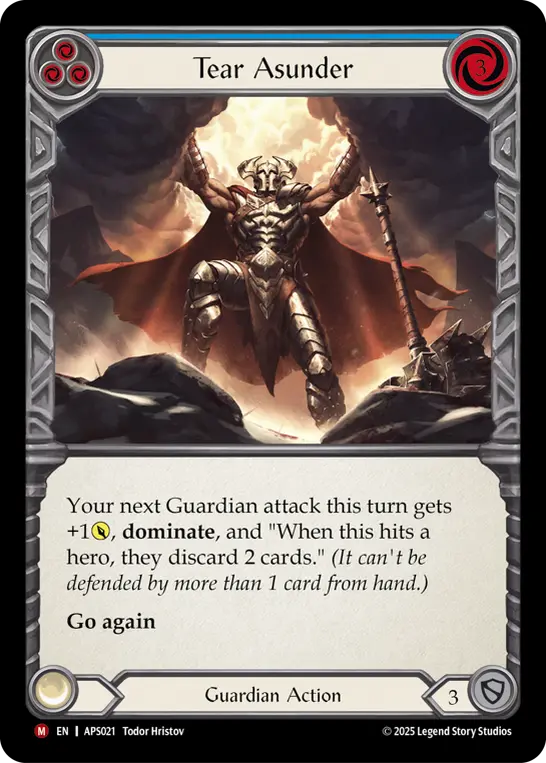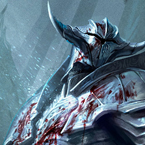We've arrived at the final chapter of my Pro Oldhim series. Before wrapping this up, be sure you've read the previous 3 installments.
While the prior installments were informed by constant Oldhim Classic Constructed play, most of my play time this past month has gone toward Blitz and Draft events for Skirmish season. Despite that, I’ve made a number of changes to my Oldhim CC list to better handle the Briar-defined meta. It no longer makes sense to dedicate so much of the sideboard to our bad Prism matchup. Ice variants of Lexi and Oldhim have a natural advantage against ‘Cheerios’ Briar- so packed full of zero-cost actions that they struggle to cleanly pay the extra resources that Frostbite demands.
When we planned the schedule for this 4-part series, we had no idea that the final article would land at such a strange time. The next banned and restricted announcement is slated for December 14th, if a September news update is still reliable; and we won’t have spoilers for Everfest until February. November and early December feel very much like a lull in the action.
Realistically, the meta hasn’t had enough time to really put Briar in check, if indeed it is capable of doing so; but Briar also shows some of the same patterns that Chane exhibited while coming into dominance. Not to say Brair is as broken as Chane was, but it will be interesting to see if LSS responds to the perceived ‘Briar problem’.
Oldhim's Place in the Meta
As I mentioned in the last article, the round timer remains Oldhim’s greatest enemy (outside of Prism, whose presence in Classic Constructed has receded greatly due to Briar). The timer issue, and the need to practice so intensely with the deck, are likely dissuading more players from picking up the icy hammer. Oldhim players will be hard-pressed to play efficiently and close games; even with a pitch-perfect plan and playing with nothing but speed in mind, I’ve drawn out games where I simply needed one more turn to force the win. It’s as frustrating for us as it is for the opponent playing against us. Even with a lot of practice in piloting the deck and playing with the endgame strategy in mind, it’s too easy to draw games as Oldhim.
That said, Oldhim (and Bravo) both have a favorable match against Briar. These matches tend to result in a win for the Guardian player, if they are kitted out correctly to deal with all the offensive pressure Briar can generate throughout the game. Time is not as much of a concern for Oldhim.
On the other side of the coin, Bravo remains a powerful and more-consistent hero, requiring less practice and a lot less concern around the round timer, even in some of the grindier matches.
If there is a banned and restricted announcement that significantly harms Briar, I expect Oldhim’s viability in his current state to drop as Prism is able to reemerge.
Refinement
From here on out, the Experimental deck list will be my most ‘up-to-date’ version of Oldhim. The meta is simply changing too much and too frequently to have a ‘safe list’ anymore.
Most of my refinement efforts this time around have been focused on improving matches outside of Prism and working to establish a more proactive gameplan.


The idea of pitching both Oaken Old and Tear Asunder early and often remains strong. With Remembrance back in the mix, we have a way to recur back-to-back Oaken Olds if we have blocked and thinned the deck enough. Too much of my early effort was focused around the idea of ‘fatigue’, where we lean into Oldhim’s various mechanisms to deplete our opponent’s deck while keeping our card count high. As I mentioned earlier in the series, there simply isn’t enough time in the round to pursue this as a viable strategy, as efficient as it is in the vacuum of a round timer.
Pummel (Red) has been re-introduced into the mix. As with Tear Asunder and Oaken Old, it is a valuable tool to close out games. It also provides a strong mechanism to force on-hit effects from power cards, and add discards to our attacks. Pummel certainly gains value in the late game, but also provides much-needed swings in tempo throughout the early and middle game. Do not be scared to lean into Pummel early on, especially when it means setting up an advantage and building a position that allows you to pile on the pressure.


I made room for Blizzard again in the main list as a powerful tool against the wide decks of the format. Blizzard is great to tax our opponent; and even on turns when it makes sense to block and defend with three cards from hand, it gives us something to pitch for a reasonable counter-attack with a Winter’s Wail that threatens Frostbite.
Forged for War returns in the sideboard as a hedge against Dash. Because there is so much room in the sideboard thanks to getting rid of so many of the Prism sideboard cards, there is room to comfortably reintroduce this package into the deck. With both Rampart of the Ram’s Head and the three copies of Forged for War, the match against Dash becomes hard to lose. It also provides some value when sided in against Briar, but certainly isn’t required. I enjoy playing Forged for War, even more so thanks to all the zero-defense equipment that Oldhim uses that do not have either temper, battleworn, or blade break. Blocking for free with these equipment items allows us to keep a high card count in hand while adequately protecting our life total.


Against tall decks, Staunch Response (Red) when paired with Rampart of the Ram’s Head provides great value and defensive utility against tall decks and even Runeblade and Ninja’s Enlightened Strike for 7 to round out a turn. Since Oldhim prefers to spend resources on the opponent’s turn, Staunch Response pairs perfectly with Rampart of the Ram’s Head or Crown of Seeds.
Righteous Cleansing provides another card to block with, or a powerful situational attack in many games. Paired with Tectonic Plating, simply swinging for 10 damage presents enough of a threat on its own. This is compounded with the capability to use Crater Fist to empower the attack to 12 if you have the resources- or simply throw a Pummel on top for 14 damage and a discard-on-hit!


I’m also keen on exploring a more aggressive variant of Oldhim. In my early testing, I have proven the value and power of playing out Command and Conquer with an Ice Quake (Red) off a single blue pitch- a strategy that Ice variants of Lexi have started to explore as well. Enlightened Strike and the reintroduction of the Rouse the Ancients package could help provide the backbone of a more aggressive Oldhim build, designed to present some massive attacks each and every turn. My current build remains more powerful and consistent for now, but time will tell if Oldhim's combat stance needs to change.
The Game Plan
Oldhim’s gameplan is simple enough, but requires lots of practice to play efficiently and with speed in mind. All of these concepts have been explored in-depth throughout the rest of the series:
- Defend efficiently, both with resources and time- time is a resource for Oldhim.
- Block to thin the deck rather than preserve card count for fatigue. Due to time constraints, this is the most reliable way of winning as Oldhim.
- Use Oldhim’s defense reaction to get around dominate, prevent attack reactions, deny your opponent’s arsenal, and keep needed Ice and Earth cards in your deck to fuse with your late-game Oaken Olds.
- Play Command and Conquer and Endless Winter (fused) early and often. Grind down your opponent’s life and armor, softening them up for the late game.
- Pitch Oaken Old, Pummel, Remembrance, and Tear Asunder early and often.
- Keep your life and armor healthy in the early/mid-game.
- Use Remembrance to shuffle power cards back into the deck once you are down to your last 20 cards or so (ideally Oaken Olds, but sometimes Endless Winter or Command and Conquer is the right choice).
- Chain back-to-back dominated Oaken Olds (retaining Pulse of Isenloft in hand for the easy fuse) or Tear Asunder attacks, or just push a Pummel on an attack to force lethal damage over the top.
- Win?
Obviously, there are many complexities in play that change this game plan. As a defensive hero, you will be forced to react and adapt to many different situations. But usually, the outline above is the best path toward victory with this list. Understanding where you are in this roadmap is just as essential as playing the current step out correctly. Your opponent will also be working to disrupt your plans and make your life miserable. You’ll need to be ready to pivot at a moment’s notice and be patient as you watch for windows for your power turns.
Thankfully, by the time it’s time to start playing out the fused Oaken Olds, your opponent usually won’t have a reasonable counter-attack. Keep up the pressure and prevent an ‘off turn’ where you lack the offensive tools to maintain momentum.
Conclusion
I cannot overstate the importance of practicing with Oldhim, even if you’ve been playing Bravo for a long time. It takes time to become comfortable with many of Oldhim’s interactions and the synergies between his cards.
It has been incredible to play and explore the new Guardian hero. While time has been an issue in many of my games, I’ve been encouraged by my own results with Oldhim and some of the strategies that have emerged for this hero as a means to fight back against the clock.
Oldhim has proven to be a powerful defensive choice, and a hero I think we’ll see a lot more of in the future as even more cards are introduced to the game. It is exciting that the next set release will be supplemental and that there will be plenty of new Guardian cards and perhaps generics for both Oldhim and Bravo. It will be interesting to see how Everfest opens up new deckbuilding possibilities to explore for both Guardian heroes.
Thank you for joining me in the Oldhim Pro Series. I will continue to update my decklist as I make changes, and will be pursuing Oldhim in both Blitz and Classic Constructed alongside Bravo. And stay tuned for more Guardian content for both heroes as we approach spoiler season for Everfest. If you have any questions about Oldhim or my decklist choices, please don’t hesitate to join the conversation in the comments below.






